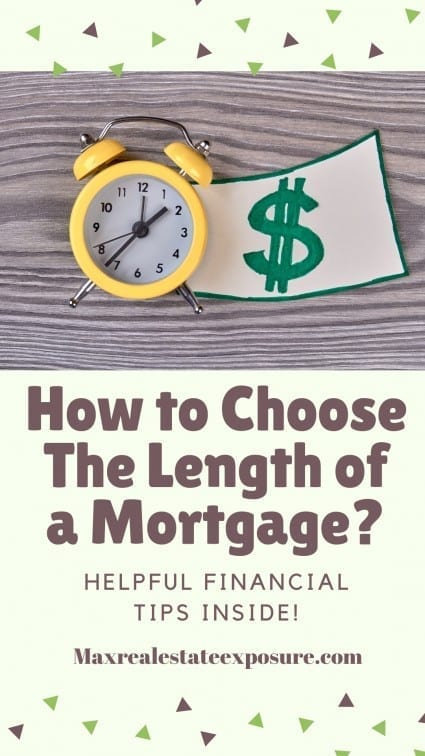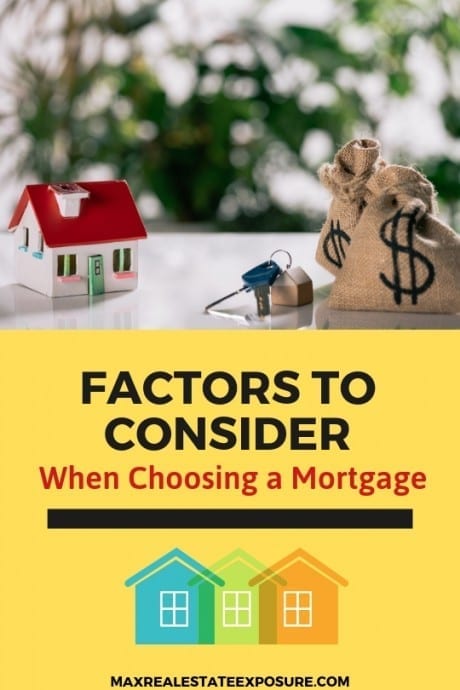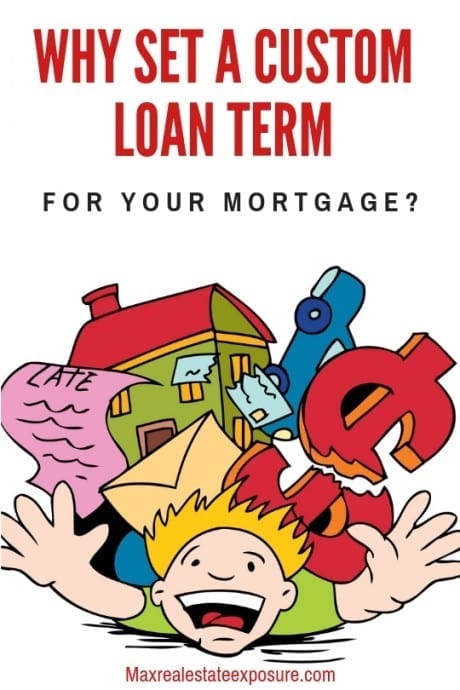Tips For Choosing a Mortgage Loan Term
 Are you wondering what term of a mortgage you should choose?
Are you wondering what term of a mortgage you should choose?
How do you know which mortgage loan term to choose?
The length of your mortgage obviously will have a significant financial impact on your monthly expenditures.
Like most people, you probably assume that mortgages are available in two flavors—30-year and 15-year terms.
These are the most popular options, which explains why buyers and owners who want to refinance assume they are the only two options.
But when you start talking to lenders, you will discover that you can get a mortgage for various terms.
Whether you want a 10-year, 12-year, 17-year, or 23-year mortgage, chances are you can find a lender that will offer it—especially if you turn to credit unions and smaller community banks.
When choosing a mortgage lender, one of your considerations may be the loan terms offered.
For many home buyers getting flexible loan terms is an attractive feature.
When you put together your checklist of questions to ask the lender, ensure you add this.
Remember that the loan term and the lender you pick will have long-term financial consequences. It is vital to get this down from day one.
What is a Mortgage Term?
The length of a loan is called the mortgage term.
The mortgage term is how many years it will take to pay off the mortgage. For example, a 15-year loan gives you 15 years to pay off the mortgage, and a 30-year loan gives you 30 years.
How long a mortgage loan is will depend on the term you choose. No matter what the mortgage term is, you will make a payment to the lender each month.
If you choose a 30-year mortgage term, you’ll likely have lower mortgage payments than opting for a shorter period since the amount due is spread over a longer time.
If you opt for a shorter mortgage term, the payments are spread out over a shorter time, making the payments higher.
Your interest rate with the lender and payment schedule can vary dramatically based on the mortgage term length. When you choose a longer mortgage term, you’ll pay more interest over the life of the loan.
The longer it takes to pay off the principal, the more interest you will pay on the loan. This is how lenders make money.
When you opt for shorter loan terms, you’ll have a higher monthly mortgage payment but will pay less interest to the lender.
Some borrowers decide to pay off their mortgage early. One of the reasons will be to eliminate paying additional interest.
How Long Are Mortgages?
The length of a mortgage can range from 10-40 years. Standard mortgages are 15 or 30 years in length. The average length of a mortgage is under 10 years.
It is not because people pay off their loans in record time, but most refinance into a different mortgage. It could be they want to pay a lower interest rate, shorten the length of their mortgage, or have a different type of loan.
Standard mortgages are the most popular for buyers purchasing homes.Click To TweetYour Options for The Term of a Mortgage
Mortgage length options can vary from lender to lender.
Around 90 percent of all borrowers purchasing homes opt for a 30-year fixed-rate loan. It is by far the most popular mortgage term.
A 30-year rate makes it possible to get into a home that you might not be able to afford at a 15-year term and gives you the breathing room you need to manage the rest of your finances.
That may be why more customized loan terms only gain popularity with those refinancing their homes. When refinancing, your goals differ from when you first purchase a home.
You may not realize that the same customized terms available to those who refinance their homes are also often available for those purchasing homes.
Of course, you have to qualify for the loan, which may present a challenge the shorter the term gets, but the option is there for eligible borrowers.
These customized terms used to be offered primarily by smaller community banks and credit unions. Times have changed. Now many of the biggest lenders have opened up options for customized terms.
From Quicken Loans’ “YOURgage” program to Chase’s offers for loans ranging from 10 to 40 years, there are more options than ever for getting a loan on pretty much whatever terms you desire.
Many mortgage providers will customize the length of the loan term for you. Some do not advertise this feature, but if you ask, they likely accommodate your financing needs.
Be sure to understand that while a thirty-year fixed conventional loan is the most popular, it is one of the mortgage myths to assume it’s the best choice for you.
Understanding how to get a mortgage involves choosing the most suitable mortgage term for your financing needs.
Reasons Why You Might Want a Custom Loan Term
How do you know which loan term is the right choice? Every individual has a unique financial situation and specific financial goals in mind. That is why custom mortgage terms are ideal for some and not others.
If you are wondering if they might be right for you, consider the following benefits:
 1. You Can Set a Payoff Date That Suits Your Schedule.
1. You Can Set a Payoff Date That Suits Your Schedule.
With a custom mortgage term, you can create a situation where your loan payoff date is suitable when you need it to be.
For example, you could choose a payoff date that falls at the time of your retirement. That way, when you retire, you are done with your mortgage and can spend your money living the life you want after you quit working.
Or, if you are starting to buy a home early as a first-time buyer, you could set your date to pay off the loan when your child begins college.
There are many first-time home buyer programs where you can set the mortgage term.
2. You May Find Low-Interest Rates Make a Shorter Mortgage Term Affordable.
When interest rates are high, more people are pushed into longer terms due to the cost of monthly payments.
High-interest rates mean higher monthly payments, sometimes making a 30-year term a necessity. Now, some lenders will push off the length of a mortgage to forty years.
But when interest rates are low, you may find that you can afford a shorter loan term—which gives you all the benefits that come with that term at a price you can afford each month.
You may enjoy lower interest, pay less interest overall, and pay your mortgage off way quicker than you thought was possible.
3. You Can Pay Less Interest With a Shorter Mortgage Term.
One of the most important considerations for picking the length of a loan term is mortgage interest. Choosing a shorter loan term will often lead to savings of thousands, if not tens of thousands, of interest.
Typically, the longer a lender gives you to pay back a loan, the more interest they can collect.
Once you start whittling away the length of your term, from 30 to 20 to even 10, you chop away at the amount of interest that the lender will expect from you in exchange for the privilege of borrowing money.
Saving on interest payments is a big deal for those who refinance their homes for obvious reasons. They have already been paying interest for possibly years or even decades.
Once they go to refinance, the last thing they want is to sign on for another 30 years of interest payments.
Instead of opting for essentially restarting their loan, they often ask for terms that are a little more favorable for them—virtually anything shorter than the regular 30-year mortgage they started with.
For example, let’s say you started with a thirty-year mortgage. In year five, interest rates have dropped quite a bit. You want a lower interest rate, but you don’t want to go backward to a thirty-year loan after making payments for five years.
The solution is to refinance at a lower rate while requesting a new loan with a shorter mortgage term. You could opt to go for a twenty-five-year period or even something faster.
Besides lower interest rates, some folks will time a refinance when they know they’ve got at least twenty percent equity in the property and can eliminate private mortgage insurance.
4. You Can Find The Right Loan For Your Budget.
You have your own financial goals, so you need to find a loan that fits your parameters. While taking out a 30-year mortgage may be the most reasonable option, there is the possibility that you could find a mortgage term that still works with your budget while also being shorter than 30 years.
Even if the interest rate is a little higher, you might find that you can get a 25-year or maybe even a 20-year mortgage and still make the payments work.
If so, you will likely find that your loan is more affordable than you had expected.
Factors to Consider When Choosing The Term of a Mortgage
 There are various factors you need to consider when choosing a loan. The three most important are the following:
There are various factors you need to consider when choosing a loan. The three most important are the following:
Interest Rate and Fees
The interest rate is probably your biggest concern, as are the expenses accompanying the loan.
Generally speaking, a shorter-term loan will be available at a lower interest rate—but the benefits of going shorter might diminish as you get closer to the shortest-term loans.
For example, the rate might improve noticeably between a 30-year mortgage and a 15-year loan. It might still be slightly better between a 20-year loan and a 15-year loan.
But the difference between a 15-year loan and a 10-year loan might not be as drastic.
Monthly Mortgage Payments
The monthly payments on a loan with a shorter term might be higher than those on a longer-term loan—but the difference may not be as significant as you expect.
The lower interest rate on a shorter term may wind up balancing some of that difference to the point where you only pay slightly more for a shorter period.
Be sure to compare your monthly payments for each loan you are considering.
The Amortization Schedule
Understanding amortization over the mortgage term is essential.
A 30-year fixed-rate mortgage will typically have you pay mostly interest during the first few years of your loan. That means you may barely touch the principal for multiple years.
But with a shorter-term loan, you might start paying off the principal much sooner. You can get your lender to create amortization tables to show you what each loan will look like as you pay it off over time.
What About Bi-Weekly Payments?
Some people are scared of going with a fifteen-year mortgage even though they will pay considerably less mortgage interest over the life of the loan. The fear is usually on things such as a loss of income, job loss, or change in family status.
An alternative fallback for some folks is to go with bi-weekly mortgage payments or even make an additional mortgage payment or two a year.
Doing so will pay down your mortgage quicker and retain the option of not doing anything.
The payments on having a thirty-year mortgage would be lower than going with a fifteen-year loan, but you can still pay down the principal resulting in a quicker loan payoff.
The Term of a Mortgage With Fixed vs. Adjustable Rates
Besides the length of a mortgage, it is also essential to choose whether an adjustable-rate mortgage or a fixed one is best. Most buyers will opt for fixed rates due to financial stability.
However, if you know with certainty, you could move in less than 3-5 years, an adjustable rate might be best.
With a fixed-rate mortgage, the interest rate stays the same for the length of your mortgage. Fixed-rate mortgages traditionally come in 10, 15, 20, 25, or 30-year terms.
There are even some lenders who will do a 40-year term.
The benefit of an adjustable-rate mortgage is a lower mortgage rate for a specified number of years. Initial interest rates are usually lower than fixed-rate mortgages.
The introductory rate can last as long as ten years. Once the ten years are up, the rate becomes variable for the remaining loan length. The interest rate will adjust every year when the introductory period is over.
For example, a 5/6 ARM would be fixed for the first five years and then adjustable after year five.
There are several options for the fixed rate period for adjustable loans. You can have a 5/6, 7/6, or 10/6 with an adjustable mortgage with a 30-year loan length.
There are pros and cons for fixed and adjustable rate mortgages. Just like the term of a mortgage, it will depend on your housing and financial goals.
Weighing Shorter and Longer Terms of a Mortgage
Pros of a Shorter Term of a Mortgage
- Best mortgage interest rate
- Fewer mortgage payments
- Pay off your mortgage quicker
- Pay less in mortgage interest
Pros of a Longer Term of a Mortgage
- Lower monthly mortgage payments
- Potential lower rates in the future with an adjustable mortgage
- Longer period to pay a mortgage
Make The Term of a Mortgage Work For You
Ultimately, you need a loan that fits your financial situation and goals. Consider all your options, including customized loan terms, to ensure you make the right choice.
Maybe a standard mortgage is best. On the other hand, it might not be.
If you have not taken out a mortgage in a while, here is a review of what the lender will need to give you a mortgage. Remember that different loan programs will require more or less documentation.
Picking the length of your mortgage is a significant financial consideration. Weigh your options carefully before deciding which loan term is best for you.
Additional Helpful Home Buying Resources
- Don’t make an offer on a home like this – see what not to do when you have found the home you love and want to make an offer. You could end up costing yourself your dream property.
- What to think about when buying a home to demolish – are you considering purchasing a tear-down property? See what you need to know before getting involved in this real estate transaction.
- How to pick a neighborhood you will enjoy – see some excellent tips on finding a neighborhood you will love when purchasing a home. Avoid making common mistakes that could trip up your purchase.
Use these excellent resources to make the best decisions when buying a home.
About the Author: The above Real Estate information on how to choose the term of a mortgage was provided by Bill Gassett, a Nationally recognized leader in his field. Bill can be reached via email at billgassett@remaxexec.com or by phone at 508-625-0191. Bill has helped people move in and out of many Metrowest towns for the last 37+ years.
Are you thinking of selling your ham passionate about real estate and love sharing my marketing expertise!
I service Real Estate sales in the following Metrowest MA towns: Ashland, Bellingham, Douglas, Framingham, Franklin, Grafton, Holliston, Hopkinton, Hopedale, Medway, Mendon, Milford, Millbury, Millville, Natick, Northborough, Northbridge, Shrewsbury, Southborough, Sutton, Wayland, Westborough, Whitinsville, Worcester, Upton, and Uxbridge MA.


 1. You Can Set a Payoff Date That Suits Your Schedule.
1. You Can Set a Payoff Date That Suits Your Schedule.